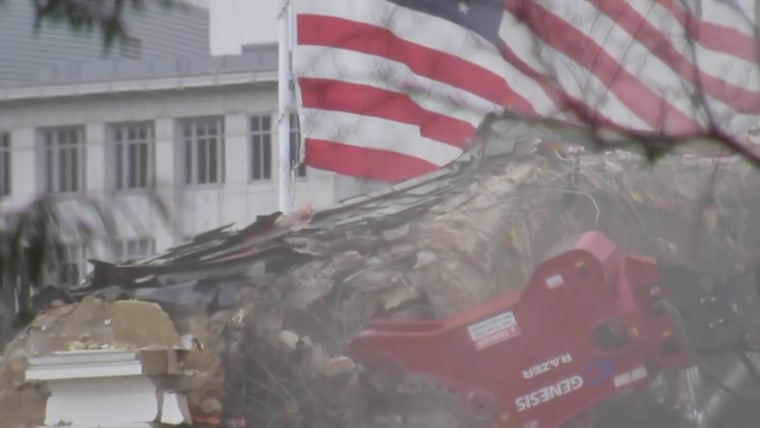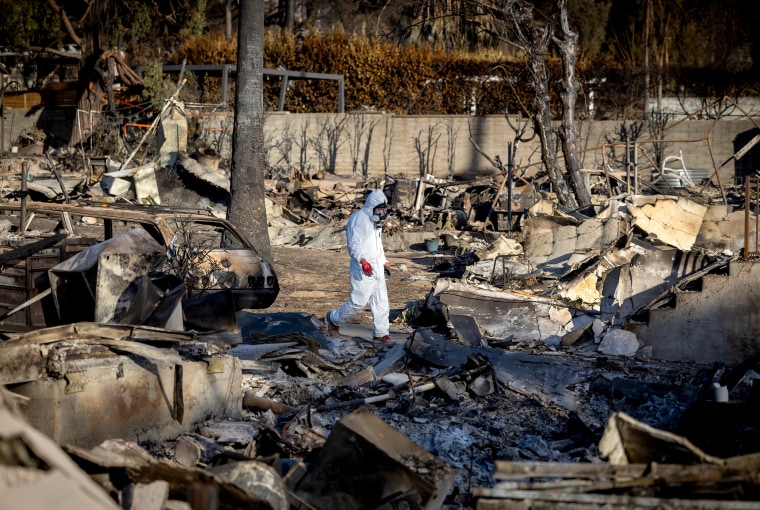The White House hopes its new sanctions on Russia’s oil industry push Putin into peace talks with Ukraine. Some new ICE recruits arrive to training without full vetting, revealing criminal backgrounds and underqualified candidates. And a non-profit reveals a large price tag on weather and climate disasters after federal cuts.
Here’s what to know today.
White House ramps up pressure on Russia with oil sanctions

The Treasury Department announced new sanctions targeting Russia’s oil sector after President Donald Trump confirmed a planned meeting with his counterpart Vladimir Putin to discuss an end to the war in Ukraine was called off.
“Now is the time to stop the killing and for an immediate ceasefire,” Treasury Secretary Scott Bessent said in a statement. “Treasury is prepared to take further action if necessary to support President Trump’s effort to end yet another war. We encourage our allies to join us in and adhere to these sanctions.”
This is Morning Rundown, a weekday newsletter to start your day. Sign up here to get it in your inbox.
The two companies being sanctioned are Rosneft and Lukoil and some of their subsidiaries, the statement said. Despite the war, Rosneft and Lukoil are worth more than $50 billion each and are two of the biggest companies listed on the Moscow Stock Exchange.
A senior White House official told NBC News that Trump was following his gut on the timing of the sanctions. Last week, relations between Washington and Moscow appeared to be warming after Trump held a call with Putin and did not approve Ukrainian President Volodymyr Zelenskyy’s request for long-range Tomahawk missiles.
Trump’s latest peace push hit a roadblock during a call between Secretary of State Marco Rubio and Russian Foreign Minister Sergey Lavrov, according to senior figures on both sides.
U.S. expands lethal strikes on alleged drug-smuggling boats to eastern Pacific

Defense Secretary Pete Hegseth said the military launched a second lethal strike in as many days against what he said were vessels involved in drug trafficking operations in the eastern Pacific.
The first strike, which Hegseth said happened Tuesday, was said to have killed two people. The second attack killed three men he called “narco-terrorists.” The strikes are the first in the eastern Pacific since the Trump administration began attacking vessels that it has claimed are involved in drug trafficking.
Hegseth said in last night’s statement that missions would continue, and he characterized the military action as similar to strikes against the terror group Al Qaeda.
White House’s East Wing to be fully demolished for Trump’s ballroom

The entire East Wing of the White House will be demolished “within days,” according to two Trump administration officials.
The demolition is a significant expansion of the ballroom construction project that Trump described over the summer, when he said it would not “interfere with the current building” and “pays total respect to the existing building.”
The East Wing was constructed in 1942 during Franklin D. Roosevelt’s presidency and has typically been used by the first lady and her staff. Trump said the new construction will hold up to 900 people, and the total price would be about $300 million. Trump said he and private donors will pay for the project.
Some ICE recruits arrived to training without full vetting

Immigration and Customs Enforcement has placed new recruits into its training program before they have completed the agency’s vetting process, a current and two former Department of Homeland Security officials told NBC News. The oversights come as ICE rushes to hire federal immigration officers to carry out Trump’s mass deportation policy.
ICE officials later discovered that some recruits failed drug testing, have disqualifying criminal backgrounds or don’t meet the physical or academic requirements to serve, the sources said.
Staff members at ICE’s training academy in Georgia discovered one recruit had previously been charged with strong-arm robbery and battery stemming from a domestic violence incident, the current DHS official said. They’ve also found as recently as this month that some recruits going through the six-week training course hadn’t submitted fingerprints for background checks, as ICE’s hiring process requires, the current and former DHS officials said.
More politics news:
- A three-judge panel appeared skeptical of the Trump administration’s arguments that the president has judicially unreviewable power when it comes to the deployment of the National Guard on the streets of Los Angeles.
- Illinois is attempting to crack down on federal officers who try to disguise their vehicles in pursuit of undocumented individuals.
- Republicans are pushing back on Trump’s idea of importing beef from Argentina, with some making direct pleas to the White House to reverse course.
- Dr. Mehmet Oz suggested that Trump has a plan to replace the Affordable Care Act — but provided no specifics about the proposal.
- Senior Republican lawmakers predicted that Defense Secretary Pete Hegseth’s new policy restricting communication between Pentagon personnel and Congress will crash and burn.
Read All About It
- The World Chess Federation said it will investigate whether Russian chess champ Vladimir Kramnik should be disciplined for the disparaging public statements he made “before and after the tragic death” of American grandmaster Daniel Naroditsky.
- The nation’s second-largest measles outbreak this year is spreading beyond its epicenter along the Utah-Arizona border.
- Head Start locations are warning that their programs will be imperiled if the government shutdown stretches into November.
- An Illinois man was shot dead while incarcerated in a federal prison in Florida, a rare incident behind bars as guards largely are not allowed to carry firearms.
Staff Pick: Data rain check

The Trump administration has made big cuts to climate science. And while a lot of that work has simply disappeared, some researchers are trying to reproduce it outside of government.
After the administration stopped work on the National Oceanic and Atmospheric Administration’s billion dollar weather and climate disaster database, the non-profit Climate Central hired the researcher who left the federal government in protest of that decision. Climate Central released a new version of the database yesterday, reproduced in full with new data collected since the project was scuttled.
The database showed that 14 weather events exceeded $1 billion in damages in the first six months of 2025. The Los Angeles fires topped the list, with a cost of $61 billion, making them the most expensive wildfire event on record. Added up, it’s the most costly first six months in more than 40 years. The data release shows that weather and climate disasters continue to pose a significant economic cost and serves as a reminder that some projects have a chance to live on after they’ve been canceled. – Evan Bush, science reporter
NBC Select: Online Shopping, Simplified
Colder temperatures are here, and so are cracked lips and unexpected cold sores. The NBC Select team found the best dermatologist-recommended treatments for both.
Sign up to The Selection newsletter for hands-on product reviews, expert shopping tips and a look at the best deals and sales each week.
Thanks for reading today’s Morning Rundown. Today’s newsletter was curated for you by Christian Orozco. If you’re a fan, please send a link to your family and friends. They can sign up here.








